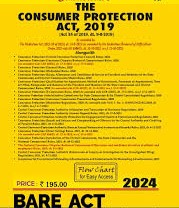Client or Consumer?
Client or Consumer?
 A bench comprising of Justices Bela M Trivedi and Pankaj Mittal said the legal profession is Sui generis (unique) where the nature of work is specialized and cannot be compared with other professions on the question of whether the lawyers be sued under Consumer Protection Act.
A bench comprising of Justices Bela M Trivedi and Pankaj Mittal said the legal profession is Sui generis (unique) where the nature of work is specialized and cannot be compared with other professions on the question of whether the lawyers be sued under Consumer Protection Act.
 It was held that the success of ‘Professionals’ often depends on factors outside their control and client cannot take legal action against their lawyers by claiming that they did not provide proper ‘Service’ as per The Consumer Protection Act 1986, (CPA). The Supreme Court decision in Indian Medical Association v/s V.P Shantha, 1995, stated that the services by the medical practitioners would fall under CPA. The National Consumer Disputes Redressal’s (NCDRC) decision in this was held that the Lawyers’ Services fall under the definition provided for the term U/S 2 (O), of The Consumer Protection Act, 1986 (CPA). If there is any deficiency in the service the NCDRC held that complain could be filled under CPA.
It was held that the success of ‘Professionals’ often depends on factors outside their control and client cannot take legal action against their lawyers by claiming that they did not provide proper ‘Service’ as per The Consumer Protection Act 1986, (CPA). The Supreme Court decision in Indian Medical Association v/s V.P Shantha, 1995, stated that the services by the medical practitioners would fall under CPA. The National Consumer Disputes Redressal’s (NCDRC) decision in this was held that the Lawyers’ Services fall under the definition provided for the term U/S 2 (O), of The Consumer Protection Act, 1986 (CPA). If there is any deficiency in the service the NCDRC held that complain could be filled under CPA.
Ruling of the Apex Court:
The Supreme Court distinguished between the terms ‘Business’ or ‘Trade’ and ‘Profession’. The Apex court reiterated that Business or Trade have Commercial connotation and cannot be used interchangeably with the term Profession.
Advocates have to respect Clients autonomy and are not entitled to make concessions without express instruction from client and there is a considerable amount of direct control of advocates with the clients. The contract is not a contract in the strict terms but the nature of service which is provided can safely by termed ‘personal service’. Therefore it can be excluded from the definition under CPA. The reason for this is that the Lawyers follow their client’s instructions and cannot make decisions at their own instance; it makes the legal contract personal in nature.
The Terms ‘Service’ is defined very broadly under the CPA but excludes Free Services and contracts of personal service.

The Lawyers render service and charged the fee for it which is a basic requirement of the term ‘Service’ under CPA 1986. Though, it is necessary to point out that a lawyer may not be held responsible for the outcome of the case but surly he is responsible for deficiency in rendering the promised services. Further, it can be inferred that deficiency in the services must be considered under the lens whether it is preformed negligently or deficiently. It cannot be viewed on the basis of the cases which are lost, otherwise it would give the right to the client to sue their lawyers.
Section 2 (1) (g) of CPA defines the ‘Deficiency in Service’- it must be in relation to and always in term of service which the advocate provided to the client. Thereby indicating that if the grievance pertains to the matter which does not fall in the definition of Service section 2(1) (O), the concept of deficiency would not apply. So as to say that the advocate would not be liable to the client under CPA 1986.
Conclusion:
The Apex Court ruled that the advocates are not liable for deficiency of services under the Consumer Protection Act 1986, and therefore cannot be sued for poor service before the consumer courts. The Lawyers can only be tried for Professional Misconduct. Professional Misconduct is any action that puts the Advocate in conflict with their profession or rendered them unfits to practice. Professional Misconduct includes the following:
- Betraying the trust of the client.
- Practicing fraud through certain means.
- Deceiving the court.
- Deceiving the opposing party or their counsel.
- Improper or Inappropriate behavior.
- Behavior that is unlawful according to law.
- Immorality.
- Carelessness in discharge of duties.
- An Act forbidden by Law.
- Transgression.
All though the Bar Counsel of India and the BCI Act do not specifically define Professional Misconduct but serious penalties has been established for any registered advocate who commits or falls to commits such an Act.
– MAMTA SINGH SHUKLA
(ADVOCATE DELHI HIGH COURT)
MOBILE – 9560044035
Email Id: adv.mamtasinghshukla@gmail.com

